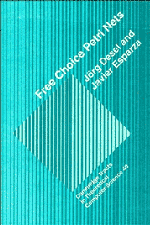Book contents
- Frontmatter
- Contents
- Preface
- 1 Introduction
- 2 Analysis techniques for Petri nets
- 3 S-systems and T-systems
- 4 Liveness in free-choice systems
- 5 The Coverability Theorems
- 6 The Rank Theorem
- 7 Reduction and synthesis
- 8 Home markings
- 9 Reachability and shortest sequences
- 10 Generalizations
- References
- Index
- List of symbols
- List of main results
6 - The Rank Theorem
Published online by Cambridge University Press: 21 October 2009
- Frontmatter
- Contents
- Preface
- 1 Introduction
- 2 Analysis techniques for Petri nets
- 3 S-systems and T-systems
- 4 Liveness in free-choice systems
- 5 The Coverability Theorems
- 6 The Rank Theorem
- 7 Reduction and synthesis
- 8 Home markings
- 9 Reachability and shortest sequences
- 10 Generalizations
- References
- Index
- List of symbols
- List of main results
Summary
In this chapter, we provide a result which characterizes well-formedness of free-choice nets in a very suitable way for verification purposes. All the conditions of the characterization are decidable in polynomial time in the size of the net. The most interesting feature of the result is that it exhibits a tight relation between the well-formedness of a free-choice net and the rank of its incidence matrix. Accordingly, it is known as the Rank Theorem. It will be an extremely useful lemma in the proof of many results of this chapter and of the next ones.
We also provide a characterization of the live and bounded markings of a well-formed free-choice net. Again, the conditions of the characterization can be checked in polynomial time. Together with the Rank Theorem, this result yields a polynomial time algorithm to decide if a given free-choice system is live and bounded.
In the last section of the chapter we use the Rank Theorem to prove the Duality Theorem. This result states that the class of well-formed free-choice nets is invariant under the transformation that interchanges places and transitions and reverses the arcs of the net.
Characterizations of well-formedness
Using the results of Chapter 4 and Chapter 5, it is easy to obtain the following characterization of well-formed free-choice nets.
Proposition 6.1A first characterization of well-formedness
Let N be a connected free-choice net with at least one place and at least one transition.
N is structurally live iff every proper siphon contains a proper trap.
[…]
- Type
- Chapter
- Information
- Free Choice Petri Nets , pp. 111 - 134Publisher: Cambridge University PressPrint publication year: 1995



